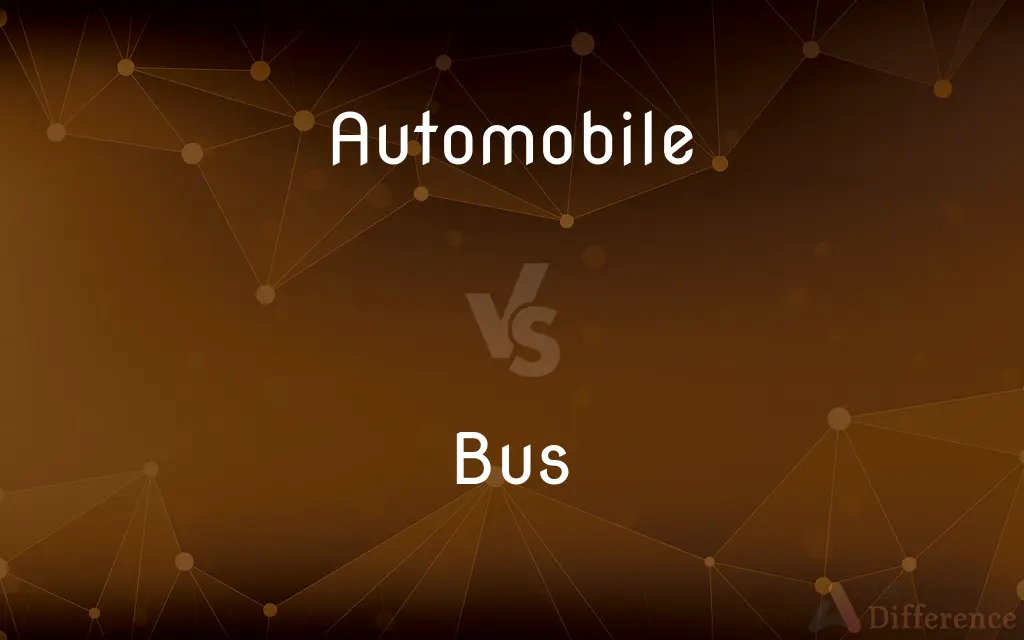Automobile vs. Bus — What's the Difference?
Edited by Tayyaba Rehman — By Fiza Rafique — Updated on March 16, 2024
Automobiles are personal vehicles, typically for small groups, whereas buses are designed for public transport, accommodating larger numbers.

Difference Between Automobile and Bus
Table of Contents
ADVERTISEMENT
Key Differences
Automobiles are typically owned and operated by individuals or families for personal transport. They range from compact cars to SUVs, designed for versatility and convenience in daily commutes and long drives. Buses, on the other hand, are operated by public or private entities and are used to transport large groups of people along predetermined routes, offering an economical and environmentally friendlier option for city commuting and intercity travel.
While automobiles provide the advantage of personal space, freedom to travel at one's own schedule, and the ability to explore off-the-beaten paths, they often come with higher maintenance costs, insurance fees, and contribute more significantly to traffic congestion and environmental pollution. Buses offer cost-effective travel, reduce the need for parking spaces, and lower individual carbon footprints, but they might not provide the same level of comfort and convenience, especially during peak hours or in less serviced routes.
Automobiles allow for customization and personal expression through choice of model, color, and accessories, catering to a wide range of tastes and needs. Buses, whereas, are designed with functionality and durability in mind, prioritizing seating capacity, safety features, and accessibility over aesthetic considerations.
In terms of technology, modern automobiles often incorporate advanced features like autonomous driving capabilities, electric powertrains, and smart connectivity for enhanced driving experiences. Buses are also evolving, with many cities adopting electric and hybrid models for cleaner transportation and implementing tech-driven solutions for route optimization and passenger information systems.
The choice between using an automobile or a bus greatly depends on individual lifestyle, priorities, and values, with automobiles offering more personal freedom and flexibility, and buses providing a communal, cost-effective, and environmentally sustainable mode of transport.
ADVERTISEMENT
Comparison Chart
Primary Use
Personal transportation
Mass transportation
Ownership
Individual or family
Public or private entities
Capacity
1-8 passengers
10-300 passengers
Cost
Higher purchase and maintenance
Cost-effective fares
Environmental Impact
Higher individual carbon footprint
Lower carbon footprint per passenger
Flexibility
Flexible routes and schedules
Fixed routes and schedules
Customization
High (model, features, accessories)
Low (standardized for efficiency)
Technology
Advanced personal features
Focus on efficiency and safety
Comfort
Personal space and convenience
Varies, can be crowded
Accessibility
Dependent on ownership
Widely accessible
Compare with Definitions
Automobile
A private mode of ground transport.
He preferred his automobile for the privacy it offered.
Bus
A public transport system vehicle.
He takes the bus to work to save on parking fees.
Automobile
A wheeled vehicle for personal transportation.
She drove her automobile to work every day.
Bus
An economical travel option for long distances.
They took an overnight bus to reach the mountains.
Automobile
A motor vehicle with seating for a small group.
Their family automobile fits four comfortably.
Bus
A vehicle for mass transportation with fixed routes.
The school bus picks up students at designated stops.
Automobile
A vehicle designed for operation by an individual.
She took pride in maintaining her automobile.
Bus
A contributor to reduced urban congestion.
The city introduced more bus lanes to encourage public transport use.
Automobile
A means of travel offering flexibility.
Their automobile was essential for weekend getaways.
Bus
A large vehicle designed to carry many passengers.
The bus route connects the entire city.
Automobile
A self-propelled passenger vehicle that usually has four wheels and an internal-combustion engine, used for land transport. Also called motorcar.
Bus
A bus (contracted from omnibus, with variants multibus, motorbus, autobus, etc.) is a road vehicle designed to carry many passengers. Buses can have a capacity as high as 300 passengers.
Automobile
Of or relating to automobiles; automotive.
Bus
A large motor vehicle carrying passengers by road, typically one serving the public on a fixed route and for a fare
A bus service
Automobile
A type of vehicle designed to move on the ground under its own stored power and intended to carry a driver, a small number of additional passengers, and a very limited amount of other load. A car or motorcar.
Bus
A distinct set of conductors carrying data and control signals within a computer system, to which pieces of equipment may be connected in parallel.
Automobile
To travel by automobile.
Bus
Transport in a communal road vehicle
Staff were bussed in and out of the factory
Automobile
Self-moving; self-propelled.
Bus
Remove (dirty plates and dishes) from a table in a restaurant or cafeteria.
Automobile
A self-propelled vehicle used for transporting passengers, suitable for use on a street or roadway. Many diferent models of automobiles have beenbuilt and sold commercially, possessing varied features such as a retractable roof (in a convertible), different braking systems, different propulsion systems, and varied styling. Most models have four wheels but some have been built with three wheels. Automobiles are usually propelled by internal combustion engines (using volatile inflammable liquids, as gasoline or petrol, alcohol, naphtha, etc.), and sometimes by steam engines, or electric motors. The power of the driving motor varies from under 50 H. P. for earlier models to over 200 H. P. larger models or high-performance sports or racing cars. An automobile is commonly called a car or an auto, and generally in British usage, motor cars.
Bus
A long motor vehicle for carrying passengers, usually along a fixed route.
Automobile
To travel in an automobile.
Bus
(Informal) A large or ungainly automobile.
Automobile
4-wheeled motor vehicle; usually propelled by an internal combustion engine;
He needs a car to get to work
Bus
A four-wheeled cart for carrying dishes in a restaurant.
Automobile
Travel in an automobile
Bus
(Electricity) A bus bar.
Bus
(Computers) A parallel circuit that connects the major components of a computer, allowing the transfer of electric impulses from one connected component to any other.
Bus
To transport in a bus.
Bus
To transport (schoolchildren) by bus to schools outside their neighborhoods, especially as a means of achieving racial integration.
Bus
To carry or clear (dishes) in a restaurant.
Bus
To clear dishes from (a table).
Bus
To travel in a bus.
Bus
To work as a busboy.
Bus
(automotive) A motor vehicle for transporting large numbers of people along roads.
Bus
An electrical conductor or interface serving as a common connection for two or more circuits or components.
Bus
Part of a MIRV missile, having on-board motors used to deliver the warhead to a target.
Bus
An ambulance.
Bus
To transport via a motor bus.
Bus
To transport students to school, often to a more distant school for the purposes of achieving racial integration.
Bus
To travel by bus.
Bus
To clear meal remains from.
He bussed tables as the restaurant emptied out.
Bus
To work at clearing the remains of meals from tables or counters; to work as a busboy.
He’s been bussing for minimum wage.
Bus
An omnibus.
Bus
A vehicle carrying many passengers; used for public transport;
He always rode the bus to work
Bus
The topology of a network whose components are connected by a busbar
Bus
An electrical conductor that makes a common connection between several circuits;
The busbar in this computer can transmit data either way between any two components of the system
Bus
A car that is old and unreliable;
The fenders had fallen off that old bus
Bus
Send or move around by bus;
The children were bussed to school
Bus
Ride in a bus
Bus
Remove used dishes from the table in restaurants
Common Curiosities
What is the primary difference between an automobile and a bus?
Automobiles are for personal use, offering privacy and flexibility, while buses are designed for mass transportation along fixed routes.
Can an automobile be used for commercial purposes?
Yes, automobiles can be used for commercial purposes, such as deliveries or taxis.
Which is more environmentally friendly, an automobile or a bus?
Per passenger, buses are generally more environmentally friendly due to lower carbon emissions.
How do buses contribute to reducing traffic congestion?
Buses transport many passengers at once, reducing the number of individual vehicles on the road.
Do all automobiles have the same capacity?
No, automobile capacity ranges from two-seaters to larger vehicles that can seat eight or more.
Are buses always public?
Buses can be public or privately operated, including school buses, charter buses, and city transit buses.
Is it cheaper to own an automobile or to travel by bus?
Traveling by bus is usually more cost-effective than owning and maintaining an automobile.
Can buses offer the same level of comfort as automobiles?
Comfort levels can vary, but automobiles often provide more personal space and amenities.
Are there electric options for both automobiles and buses?
Yes, there are electric versions of both automobiles and buses, promoting cleaner transportation.
How does owning an automobile impact the environment?
Owning an automobile contributes to higher carbon emissions and environmental impact per capita.
What is the role of technology in automobiles and buses?
In automobiles, technology enhances personal comfort and driving experience; in buses, it improves efficiency and safety.
What makes buses an economical option for travel?
Buses offer lower fares and reduce the need for individual vehicle maintenance and fuel costs.
Are there any scenarios where an automobile might be preferable to a bus?
Automobiles are preferable for individuals valuing privacy, convenience, and the need to travel on their own schedule.
How does the flexibility of route and schedule compare between automobiles and buses?
Automobiles offer flexible routes and schedules, while buses follow predetermined routes at set times.
Can I travel long distances in a bus as comfortably as in an automobile?
While buses can travel long distances economically, personal comfort may vary compared to the customizable space of an automobile.
Share Your Discovery

Previous Comparison
Doubt vs. Unbelief
Next Comparison
Neuropsychiatrist vs. PsychiatristAuthor Spotlight
Written by
Fiza RafiqueFiza Rafique is a skilled content writer at AskDifference.com, where she meticulously refines and enhances written pieces. Drawing from her vast editorial expertise, Fiza ensures clarity, accuracy, and precision in every article. Passionate about language, she continually seeks to elevate the quality of content for readers worldwide.
Edited by
Tayyaba RehmanTayyaba Rehman is a distinguished writer, currently serving as a primary contributor to askdifference.com. As a researcher in semantics and etymology, Tayyaba's passion for the complexity of languages and their distinctions has found a perfect home on the platform. Tayyaba delves into the intricacies of language, distinguishing between commonly confused words and phrases, thereby providing clarity for readers worldwide.
















































